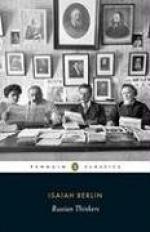|
This section contains 698 words (approx. 2 pages at 400 words per page) |

|
Russian Populism Summary and Analysis
Russian populism wasn't a single party of doctrine, but a widespread radical movement in the middle nineteenth century, declining after the 1881 assassination of Tsar Alexander II. Strongly influenced by Herzen's writings, populists believed that the Russian peasant commune reflected a uniquely harmonious and just social order, whose principles should apply to society. These communes, or obshcnina, were organized into collectives called mir, which periodically redistributed land to be tilled among peasants. Western radicals such as Fichte, Buonarroti, Fourier, Hegel, Mill, Proudhon, Owen and Marx all influenced the populists. Their opposition to both individualism and authoritarian centralism may also have owed something to Russian Orthodox traditions, which eschewed both Catholic centralism and Protestant individualism.
The most important populist leader, Nikolay Chernyshevsky, was neither a brilliant intellect, an original thinker nor an eloquent writer. Instead, Chernyshevsky had an un-Russian gift for...
(read more from the Russian Populism Summary)
|
This section contains 698 words (approx. 2 pages at 400 words per page) |

|




